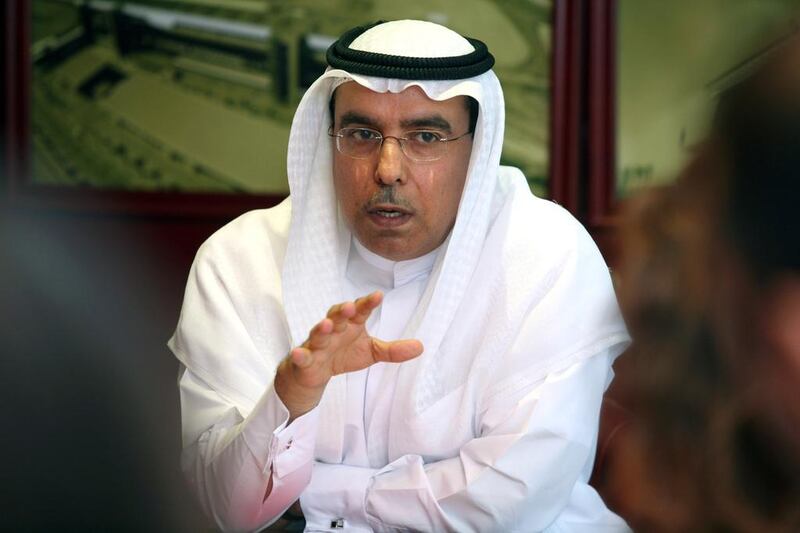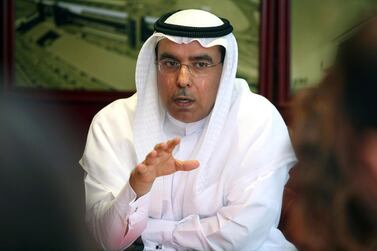Dubai Investments is assessing acquisitions in healthcare, education and other sectors and will soon start a new real estate project worth Dh1 billion in Ras Al Khaimah as the UAE's economy recovers from the coronavirus pandemic.
"We are positioning ourselves to move ahead. We look at the market changes and market trends and we choose whatever we think will definitely give a good return to the shareholders," chief executive Khalid Bin Kalban told The National in an interview.
Set up in 1995, Dubai Investments – in which Dubai’s sovereign wealth fund Investment Corporation of Dubai holds an 11.54 per cent stake – has companies involved in a range of sectors including real estate, industrial, financial services, healthcare and education. It owns businesses such as Dubai Investments Park, venture capital company Masharie, Al Mal Capital and district cooling company Emicool.
Dubai Investments last month increased its stake in National General Insurance Company to 29.99 per cent and "aims to buy more into the company", Mr Bin Kalban said.
Earlier this week, the company reported a Dh123.8 million profit for the three months to March 31, compared to a Dh6.8m loss in the same period last year as total income increased by more than 37 per cent to Dh637.6m.
Dubai Investments' healthcare holdings include KCH Healthcare London, which manages King’s College clinics and hospitals in Dubai as well as Clemenceau Medicine International – an affiliate of Johns Hopkins International with medical centres in Lebanon, Riyadh and Dubai Healthcare City. It also owns Globalpharma, which manufactures and markets pharmaceutical products across the Middle East.
In the education sector, it owns two universities – Modul University Dubai and University of Balamund Dubai. It plans to expand in the education sector in Africa, where it has already built a school in Nairobi and has two under construction in Egypt. More are planned in Egypt and Morocco, Mr Bin Kalban said.
Dubai Investments is also in “serious discussions to establish something like Dubai Investments Park in Egypt and Angola”, Mr Bin Kalban said.
“Hopefully, [we] will make a conclusion by year end on this front. So if that comes, that would be a great help for Dubai Investments to expand outside our conventional market.”
He did not provide details on the total size or level of investment planned for these projects. Dubai Investments Park is a mixed-use industrial, commercial and residential free zone spread across 2,300 hectares near Al Maktoum International Airport. The site hosts more than 4,600 companies serving a range of sectors including oil and gas, construction and pharmaceutical industries.
In the real estate sector, Dubai Investments plans to launch a new project in Ras Al Khaimah with a total cost of Dh1bn in 2021, he said.
“We just finished the master plan for it in Murjan Island. It will have 170 villas, a hotel, serviced apartments and retail units. Demand for such projects is very high in Ras Al Khaimah.”
Property prices in the UAE are expected to stabilise in 2021 as the economy recovers from a coronavirus pandemic-induced slowdown and government initiatives spur growth. New programmes such as visas for expatriate retirees and the expansion of the 10-year golden visa scheme to attract foreign professionals to the UAE are also expected to support the sector.
“Real estate market in Dubai is showing positive signs and there is a good level of demand coming from abroad. We have a lot of enquiries for our properties and this year looks much better than 2020,” Mr Bin Kalban said.
The company plans to sell Dh800m worth of residential units in 2021.
Dubai Investments is also delivering a Dh500m project in Fujairah with shopping malls, residential and office towers and a hotel as well as a Dh3bn mixed-use scheme in Mirdif with over 1,000 residential units, an office building and a hotel.
“Hopefully we will take the [Mirdif] project soon from the contractor as it is almost completed. We have already started leasing the mall. We will open the hotel by the end of summer.”
The company will finance new deals through a mix of bank loans and its own cash, Mr Bin Kalban said.
“We do have reasonable liquidity within the company and our cash flow generated by group companies will help us develop those projects. We will resort to bank borrowing and we have good relations with the banks and have a good line of credit with them.”
The company also plans to start a digital bank. The application for this is “pending with the authorities even though we raised the capital”, he said.
It will be “more or less an investment bank with private banking activity, [wealth] management and investing in financial products”, he said.








